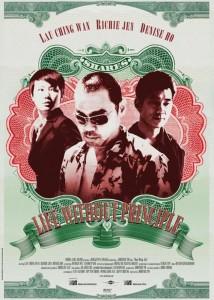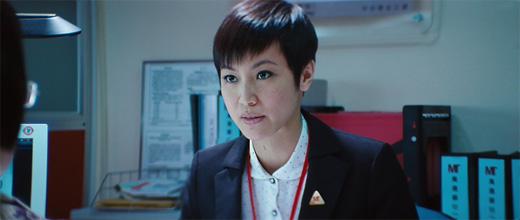
Written by Kin-Yee Au, Ka-kit Cheung, Ben Wong, Nai-Hoi Yau and Tin-Shing Yip
Directed by Johnnie To
Hong Kong, 2011
Just one of the ever-prolific Johnnie To’s latest efforts, Life Without Principle weaves together a triumvirate of stories, each concerned with the effects of the current global economic crisis. Its English title is shared with a famous essay by Henry David Thoreau on righteous livelihood, and the film explores some of the principles of Thoreau’s doctrine in its examination of society’s relationship with money. One of its strengths is in its cold framing, with shots divided into smaller segments against frequent backdrops of either shifting stock figures or oppressive business environments, almost suffocating its desperate characters. It is fitting due to their positions stuck in moral and economic crises, though it is also highly appropriate given one story’s relation to the housing crisis: every space in the frame must be filled, just like every available living space in Hong Kong must quickly be sold.
That strand concerning the housing crisis involves a detective who, outside of work, is in a constant stand-off with his fiancée regarding investing in an expensive apartment, though it is a conflict that involves him never committing to heavy discussion of the issue rather than verbal disputes. There’s also an investment manager at a bank who, in a desperate attempt to hit her monthly sales target, finds herself issuing high-risk investments to low-risk investors; unfortunately, the economic crash in Greece is just round the corner. Finally, there is a loyal low-level gangster called Panther who becomes embroiled in various “easy money” schemes in attempts to help get his mob “brothers” out of trouble. Each of these individuals’ stories end up revolving around an old loan shark, whose investments have actually seen a rapid rise thanks to his lending out of high interest loans.
Life Without Principle is a very pessimistic film in its look at our attachment to money and material goods. The lone individual who manages to maintain his principles, and those of Thoreau’s essay, is the gangster. He is the one character who doesn’t dwell on earnings for himself, only becoming involved with economic games thanks to his idealistic loyalties. To’s film is a compelling portrait of greed and desperation that isn’t overly preachy, though its convoluted nature can occasionally be frustrating.
Josh Slater-Williams


